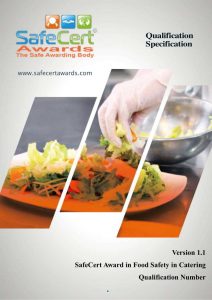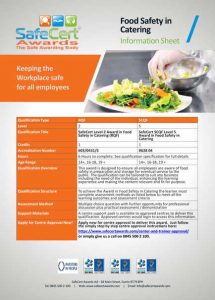Food Safety in Catering (RQF Level 2/SafeCert Level 2)
We at SafeCert Awards provide the accreditation service through our awarding body to provide our accredited trainers and accredited centres a range of Food Safety Awards.
Qualification Details
The Food Safety in Catering course is designed to ensure that all employees are aware of food safety in preparation and storage for eventual service to the public. The qualification can be tailored to suit any business including the needs of the individual, enhancing the learning experience and making the content relevant and fit for purpose. The duration of this qualification must be a minimum of 6 hours in the classroom.
This award has 1 unit called Food Safety in Catering which has four learning outcomes as follows:
- Understand how individuals can take responsibility for food safety
- Outline the importance of food safety procedures, risk assessment, safe food handling, and behaviour
- Describe how to report food safety hazards
- Outline the legal responsibilities of food handlers and food business operators
- Understand the importance of keeping him/herself clean and hygienic
- Explain the importance of personal hygiene in food safety including their role in reducing the risk of contamination
- Describe effective personal hygiene practices, for example, protective clothing, hand washing, personal illness, cuts and wounds
- Understand the importance of keeping the work areas clean and hygienic
- Explain how to keep the work area and equipment clean and tidy to include cleaning and disinfection methods, safe use and storage of cleaning chemicals and materials, and waste disposal
- State how work flow, work surfaces and equipment can reduce contamination risks and aid cleaning
- Outline the importance of pest control
- Understand the importance of keeping food safe
- State the sources and risks to food safety from contamination and cross-contamination to include microbial, chemical, physical and allergenic hazards
- Explain how to deal with food spoilage including recognition, reporting and disposal
- Describe safe food handling practices and procedures for storing, preparing, cooking, chilling, reheating, holding, serving and transporting
- Explain the importance of temperature controls when storing, preparing, cooking, chilling, reheating, holding, serving and transporting food
- Describe stock control procedures including deliveries, storage, date marking and stock rotation
The qualification is assessed in the form of a multiple choice question paper.




